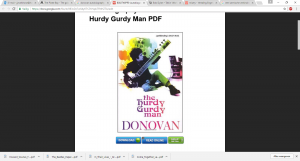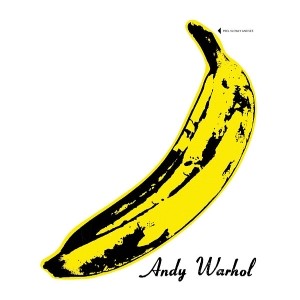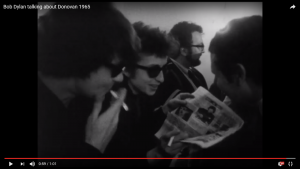by Jochen Markhorst
It is confusing reading, Donovan’s autobiography The Hurdy Gurdy Man from 2005. From the first pages the self-mystifications, selfcongratulating boasting and the clearly pumped up tall hero tales are piling up, whereby the autobiographer increasingly fails to act modesty. However, at about a quarter of the book, when the average reader is about to fire up the stove with it, a change takes place: it is starting to get farcical. We have already witnessed one after the other “cosmic connection” and “kindred spirit” and now Donovan has a first, superficial encounter of a few seconds with Brian Jones of The Rolling Stones. Jones turns around and leaves the room, and “somehow, though I didn’t know how, I sensed that I had just made a karmic connection, made contact with something that would wrench my life around and set it on a course of splendours and miseries.”
After this he shifts gear; Donovan mythologizes and romanticises almost all of his experiences and encounters, turning them into divine interventions or into earth -shattering masterstrokes of a brilliant visionary. The absurdity increases.
Dylan writes good lyrics, but “musically I am the more creative and influential”.
The Beatles should also be grateful. “Two years before the beginning of Flower Power and before The Beatles used the same refrain, I was singing Love, Love, Love.” And they could only write “I’m Looking Through You” because Donovan had shared his experiences with LSD with the boys. He does feel some reserve to let McCartney hear what he himself is doing, because Donovan and his producer know that McCartney leaks the best ideas to The Beatles.
This goes on. Andy Warhol owes the design for the cover of the first Velvet Underground LP (the cover with the banana) to… Donovan. Because in his hit “Mellow Yellow” he sang the words electrical banana.
Apparently, he also conscientiously keeps track of what other artists say about him in interviews, and he loves to pick the cherries (“Jimi Hendrix said I was the nicest person he’d ever met”).
In the spring of 1966, Donovan decides to make his latest, spectacular songs public during a series of performances in Los Angeles. “Suffice to say it was an interesting and a curious audience of known and unknown faces out there when I took the stage.”
Besides people like Phil Spector, The Byrds, Peter, Paul and Mary, Sonny and Cher and John Peel, Bob Dylan is in the audience, as Donovan is told. His friend Gyp spots “Dylan in disguise and said hello. Bob sought out darker corners where he would not be noticed.”
By now, the reader knows that Donovan is still bothered by the thousands of times he has been compared to Dylan, or is called “the Scottish Dylan”. Initially, he points out that they are both strongly influenced by Woody Guthrie (but ignores that his first hit “Catch The Wind” has borrowed quite a lot from Dylan’s “Chimes Of Freedom”).
Donovan’s repeated incantation that he really is the real thing and certainly not a fake gets somewhat pitiful, and it becomes plainly ridiculous when he tries to imply that on the contrary, Dylan admires him so much. Donovan’s descriptions of his illustrious encounters with Dylan at London’s Savoy Hotel (known from Dont Look Now) are squirmingly embarrassing, especially for the readers who remember the excerpts from Pennebaker’s documentary.
And then the most hilarious scene, or the most embarrassing one, depending on how you see it, is not even filmed. That scene survives thanks to the witty pen of sharp observer Marianne Faithfull, in her beautiful autobiography:
And then Bob said, “Well, Donovan, won’t you do us a tune?”
Donovan unpacked his guitar and began to play. I’ll never forget it. Oh, God, it was one of the most excruciatingly embarrassing and funny scenes I’ve ever sat through because what Donovan proceeded to play was “Tambourine Man”. It was the tune to “Tambourine Man” exactly. But Donovan had made up new words! It went “Oh, my darling tangerine eyes…” That’s almost all I remember of it. A song that’s never, I’m sure, ever been heard since. After halfway through, Dylan got this very wry smile on his face. Neuwirth over in the corner was cracking up. Almost everybody in the room was trying to keep a straight face because, besides Donovan and Gypsy Dave, they all knew the song well. “Tambourine Man” was on Bringing It All Back Home.
Donovan kept playing away, “My darling tangerine eyes, girl, won’t you ramble with me down my rainbow road…” It was so apparent what was happening that for a moment one might have thought Donovan was putting everybody on. But the possibility of this quickly evaporated. Donovan was incapable of putting anyone on.
The suspense was nerve-racking, and finally Dylan put an end to it.
“You don’t have to sing anymore of that one,” he said.
Donovan stopped playing, slightly bewildered.
“You know,” said Dylan, with a perfect aphoristic pause, “I haven’t always been accused of writing my own songs. But actually, that’s one I did write.”
Donovan was just stunned, dumbfounded. Oh, my God, such consternation. The poor fellow almost died. Penny said later: “There’s a song that was just written right off that poor cat’s book. He’ll never sing it again in his whole life! It was kind of a nice little song that he had, too.”
By way of explanation, Donovan said, “Well, I didn’t know, man. Heard it, you know… somewhere, at some festival I think it was. And thought maybe it was an old folk song.”
And Dylan said, “No, it’s not an old folk song yet.”
(Faithfull; An Autobiography, 1994)
Donovan himself has no memories of this comic interlude, apparently. He does remember though how he pleases a feverish, sick Dylan by playing “To Sing For You” at his sickbed. I sang it soft in the gloom of the heavily draped bedroom.
But Dylan, who in these months, certainly in combination with Neuwirth, is in the most vicious phase of his life, apparently still has a weakness for Donovan. He spares him. It is true that in the documentary we see how he and Neuwirth revel over a newspaper article about the Scotsman and we hear him say, filled with malicious anticipation, our next target – but there will be actually only one, not too deadly, shot fired.
In Manchester, Dylan plays “Talkin’ World War III Blues”, at that time already an oldie and almost removed from Dylan’s repertoire. The cabaret-like, anecdotal character of the song leads to lyrics changes in almost every performance, but this time he alters rather radically: “I looked in the closet and there was Donovan,” he crams in, to the audience’s hilarity. It is more a witty nod to the Dylan / Donovan comparisons whipped up by the press than a personal attack. Dylan also seems to say so to Donovan, there in that hotel room in Dont Look Now. “Just a joke,” something like that.
After ’65, “Talkin’ World War III Blues” disappears from Dylan’s setlist and from the music scene at all. The song being on the music-historical milestone The Freewheelin’ Bob Dylan is actually the only lasting merit. Understandable; the talkin’ blues format has already had its best time and has been milked. Apart from a single outpouring (“Alice’s Restaurant”, “A Boy Named Sue”), this mixture of conference and folk song seems dead and buried in 1965, until a mutation appears in the black slums in the late 70s: rap – a particularly resistant mutation, as it is extremely successful to this day.
Very occasionally a musician tries to breathe life into “Talkin’ World War III Blues”, hardly ever leading to a noteworthy cover. The exception is the Swiss krautrock collective Krokodil, which puts the lyrics in a “Subterranean Homesick Blues” jacket. With at least an entertaining result (on Sweat And Swim, 1973).
In addition to the chosen form, the content will also have moved Dylan to abort the song. The content is topical, pinning Dylan in a political corner where he definitely does not feel at home. Donovan recalls how he witnesses a tantrum of Joan Baez, furious because Dylan refuses to accompany her on a protest march on Trafalgar Square against the Vietnam War. And how he offers to go with her. And later is kissing and smooching with her on a hotel bed. Incidentally, in Baez’s memoirs (And A Voice To Sing With, 1987) none of these “facts” are mentioned – even the name Donovan is not mentioned anywhere.
But the scope of Donovan’s observation, whether or not fantasized, is correct: Dylan no longer wants to be identified with protest, with anti-Vietnam, with political enthusiasm.
World War III shows how that is still a bit of a shame. It has the same theme as the likewise discarded “Let Me Die In My Footsteps”, but thanks to the humour it is much more effective, it resonates much better, thanks also to the bonus, the elegant, poetic punch line.
The narrator reports to a doctor because he is suffering from a crazy dream, in which he walks through a city alone after an atomic bomb attack. He fails to get in touch with the few survivors. One runs off screaming because he thinks the narrator is a communist, another, a lady, refuses to play Adam and Eve, “because you see what happened last time coming.”
The doctor interrupts him. “I have that dream too. Only: I am the survivor. I didn’t see you there.”
In the days after, the narrator tells, it seems that everyone has this dream. And everyone walks around lonely and alone. That is not right. “I’ll let you be in my dreams, if I can be in yours.”
The pointe is a gentle, tasteful motto with which Dylan charmingly formulates an invitation to his poetry of the fifty years hereafter.




Thanks for your great website and this article!
While I do agree entirely that Donovan’s writings and chatter serve only as self-embarassment – and I have long tried to avoid anything non-musical that comes out of his mouth – I still find his songs quite consistently wonderful on their own terms. There’s no way he should have ever been compared to Dylan, clearly (Bob is almost incomparable, with Leonard, Van and Neil and Joni arguably being among the very few ‘up there’ with him). Donovan comes no-where close, and does himself a great disservice in how he presents himself. Yet … albums like Gift from a Flower to a Garden, HMS Donovan, Sunshine Superman, Open Road and others are definitely full of beauty and delights. They’ve made life a bit of a nicer place to be.
I tend to agree with Richard ( response above ) even as Jochen Markhorst‘s review of the rather silly hurdy gurdy man provides a good long read.
“Self- aggrandisment” two words that were made for Leitch.The Me,me,me man.
Thanks, very interesting. Poor Donovan he sounds insufferable, as does Dylan actually. A lot of Don’s music is really dated but I have always believed Open Road to be a masterpiece.
The movie you write of by Pennebaker is “Don’t Look Back”.
The karmic bond Dono was referring to, perhaps, is that later he would become the stepfather of Jones’s son Julian. Who was also the son of the woman Donovan came to marry, and had in fact, loved since the days before she knew Mr. Jones. Gotta know more about the scene they all had to get all that tho, din’cha Mr Writer?
As you say, “perhaps”
That’s a biographical fact that is hard to miss, actually. Donovan casually mentions it about 254 times.
That being said, I really like some of his music. The aforementioned albums, for example, and “Mellow Yellow” still is very catchy. Great horn section.
I do, however, have an opinion on his self-mystifications and childish boasting too.
We are actively promoting a link to this interesting topic on The Bob Dylan Project at:
https://thebobdylanproject.com/Song/id/618/Talkin-World-War-III-Blues
If you are interested, we are a portal to all the great information related to this topic.
Join us inside Bob Dylan Music Box.